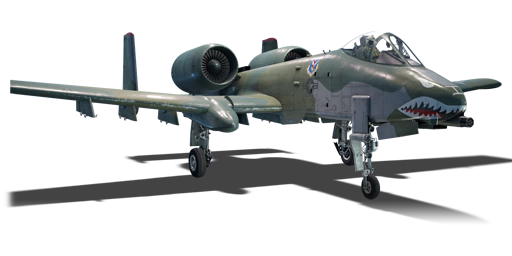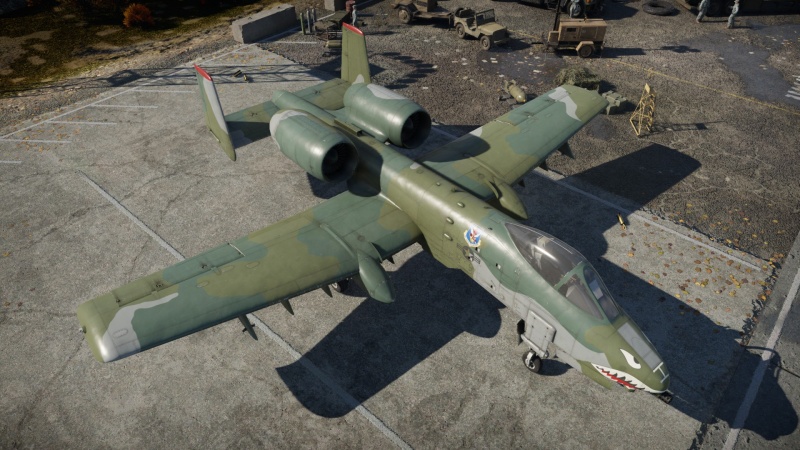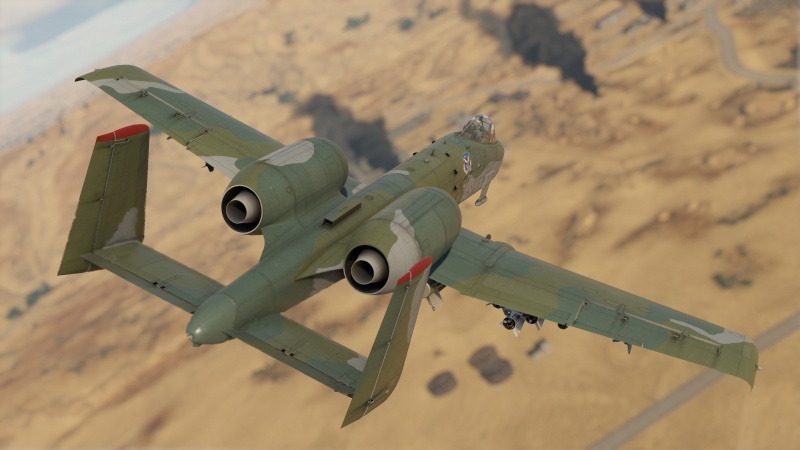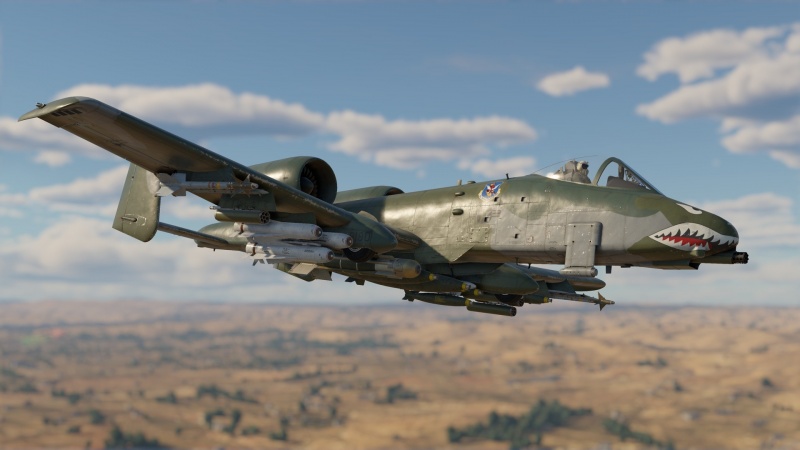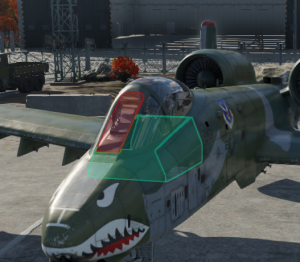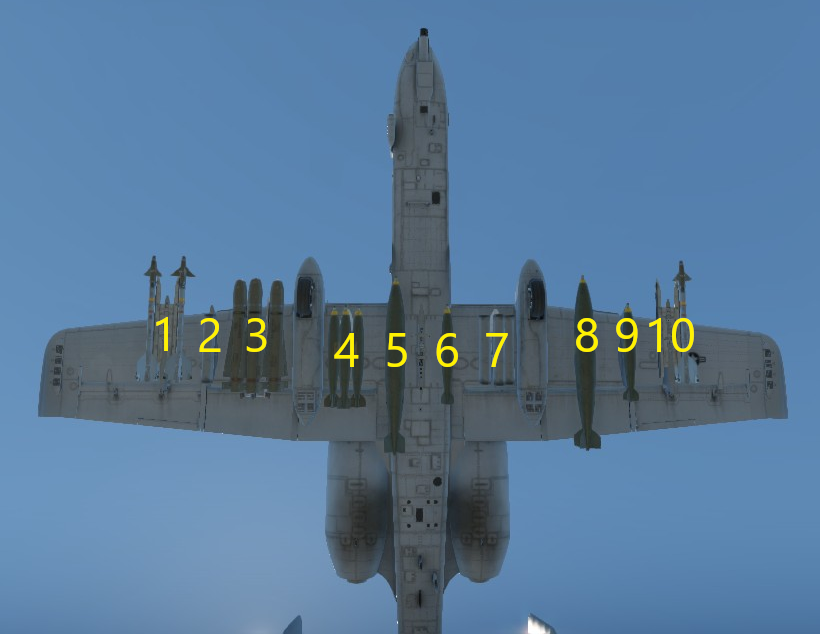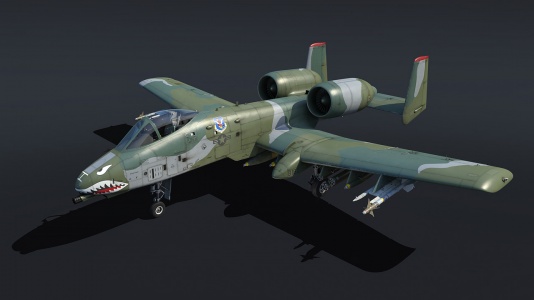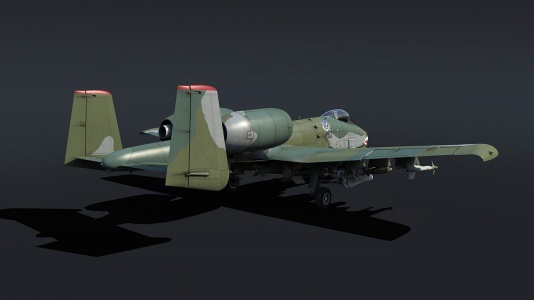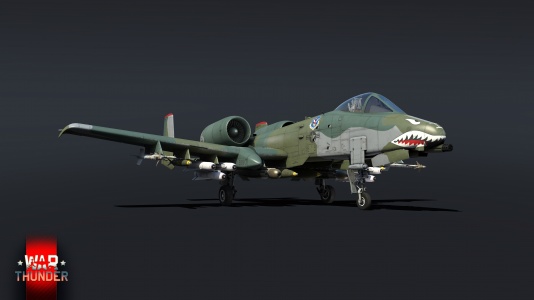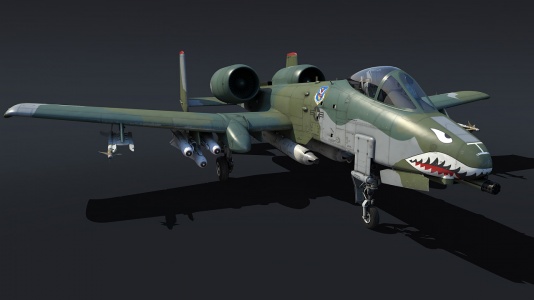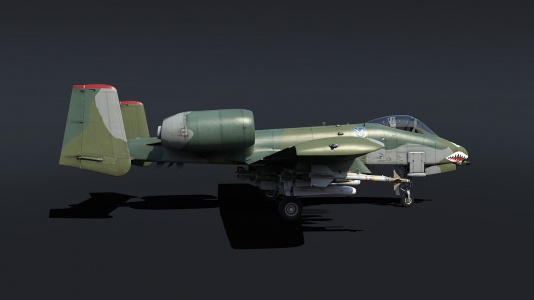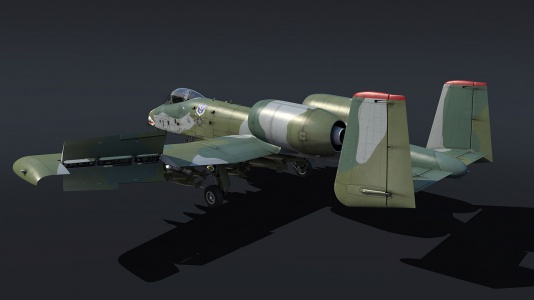Difference between revisions of "A-10A"
U129339176 (talk | contribs) (→Usage in battles) (Tag: Visual edit) |
(Edited About template) |
||
| (44 intermediate revisions by 21 users not shown) | |||
| Line 1: | Line 1: | ||
{{About | {{About | ||
| − | | about = American | + | | about = premium American strike aircraft '''{{PAGENAME}}''' |
| − | | usage = | + | | usage = other versions |
| − | | link = A- | + | | link = A-10 (Family) |
}} | }} | ||
{{Specs-Card | {{Specs-Card | ||
| Line 12: | Line 12: | ||
== Description == | == Description == | ||
<!-- ''In the description, the first part should be about the history of and the creation and combat usage of the aircraft, as well as its key features. In the second part, tell the reader about the aircraft in the game. Insert a screenshot of the vehicle, so that if the novice player does not remember the vehicle by name, he will immediately understand what kind of vehicle the article is talking about.'' --> | <!-- ''In the description, the first part should be about the history of and the creation and combat usage of the aircraft, as well as its key features. In the second part, tell the reader about the aircraft in the game. Insert a screenshot of the vehicle, so that if the novice player does not remember the vehicle by name, he will immediately understand what kind of vehicle the article is talking about.'' --> | ||
| − | The | + | The A-10A Thunderbolt II is a single-seat attack aircraft developed by Fairchild Republic. Its main mission was to help friendly forces on the ground as well as strafe enemy positions, vehicles, and more. The plane was largely designed around the incredible 30 mm GAU-8 Avenger cannon mounted in the chin of the nose. It could also carry an extensive amount of suspended ordnance. Survivability was also a key feature and the Thunderbolt II features many innovative design aspects. The pilot sat in a titanium bathtub of armour. It also had many redundancies in controlling the aircraft as well as TF34 turbofan engines which were selected due to their robust nature. The A-10's first combat role was during the Gulf War in 1991. Several A-10s were shot down from anti-air positions but overall the Thunderbolt II performed well. |
| + | Introduced in [[Update "Wind of Change"]] as a premium strike aircraft, the '''{{Specs|name}}''' is a very good ground attack aircraft with many quirks. Firstly, the Thunderbolt II is extremely heavy and underpowered. It’s a very slow aircraft and is quite vulnerable to enemy aircraft and anti-air. Although it is armoured, it can still be easily taken down by cannon rounds or missiles. Fortunately, the Thunderbolt has an extensive amount of countermeasures so missiles won’t be a major issue if players stay aware around them. The A-10 Thunderbolt II also has a multitude of ordnance options including Mavericks, GBUs, dumb bombs, rockets, and more. The most notable thing about the A-10 Thunderbolt is the 30 mm cannon. It has plenty of ammunition and can penetrate relatively thick armour for aircraft rounds. For self-defense, the Thunderbolt can carry two AIM-9Ls which are quite dangerous from rear aspect. Players should be wary of the Thunderbolt’s weird quirks but also satisfied with its armament against ground targets. | ||
== General info == | == General info == | ||
=== Flight performance === | === Flight performance === | ||
{{Specs-Avia-Flight}} | {{Specs-Avia-Flight}} | ||
<!-- ''Describe how the aircraft behaves in the air. Speed, manoeuvrability, acceleration and allowable loads - these are the most important characteristics of the vehicle.'' --> | <!-- ''Describe how the aircraft behaves in the air. Speed, manoeuvrability, acceleration and allowable loads - these are the most important characteristics of the vehicle.'' --> | ||
| − | + | As expected from a strike aircraft, the A-10 Thunderbolt is quite weak when it comes to flight performance. At its battle rating, it is the slowest aircraft which means it is very vulnerable to enemy aircraft as well as enemy anti-air vehicles. The climb rate is also poor so players should expect to stick near the ground. Fortunately, the A-10 Thunderbolt II can roll well which can help make enemy aircraft overshoot. One unintended benefit of the slow speed is the ability to turn inside of faster enemy aircraft. Overall, the A-10’s flight performance is lacklustre but has a few cards up its sleeves to defend itself. | |
{| class="wikitable" style="text-align:center" width="70%" | {| class="wikitable" style="text-align:center" width="70%" | ||
| Line 146: | Line 147: | ||
{{Specs-Avia-Suspended}} | {{Specs-Avia-Suspended}} | ||
<!-- ''Describe the aircraft's suspended armament: additional cannons under the wings, bombs, rockets and torpedoes. This section is especially important for bombers and attackers. If there is no suspended weaponry remove this subsection.'' --> | <!-- ''Describe the aircraft's suspended armament: additional cannons under the wings, bombs, rockets and torpedoes. This section is especially important for bombers and attackers. If there is no suspended weaponry remove this subsection.'' --> | ||
| − | |||
| − | |||
The '''''{{PAGENAME}}''''' can be outfitted with the following ordnance: | The '''''{{PAGENAME}}''''' can be outfitted with the following ordnance: | ||
| + | |||
| + | {| class="wikitable" style="text-align:center" width="100%" | ||
| + | |- | ||
| + | ! !! width="4%" | 1 !! width="4%" | 2 !! width="4%" | 3 !! width="4%" | 4 !! width="4%" | 5 !! width="4%" | 6 !! width="4%" | 7 !! width="4%" | 8 !! width="4%" | 9 !! width="4%" | 10 | ||
| + | | rowspan="11" width="30%" | <div class="ttx-image">[[File:Hardpoints_A-10A_Late.png]]</div> | ||
| + | |- | ||
| + | ! [[GAU-4 (20 mm)|20 mm GAU-4]] cannons (1,200 rpg) | ||
| + | | || || || || 1 || 1 || || || || | ||
| + | |- | ||
| + | ! [[LDGP Mk 82 (500 lb)|500 lb LDGP Mk 82]] bombs | ||
| + | | 1 || 1 || 1, 3 || 1, 3 || 1 || 1 || 1, 3 || 1, 3 || 1 || 1 | ||
| + | |- | ||
| + | ! [[Mk 82 Snakeye (500 lb)|500 lb Mk 82 Snakeye]] bombs | ||
| + | | 1 || 1 || 1, 3 || 1, 3 || 1 || 1 || 1, 3 || 1, 3 || 1 || 1 | ||
| + | |- | ||
| + | ! [[LDGP Mk 84 (2,000 lb)|2,000 lb LDGP Mk 84]] bombs | ||
| + | | || || 1 || 1 || 1 || 1 || 1 || 1 || || | ||
| + | |- | ||
| + | ! [[LDGP Mk 84 Air (2,000 lb)|2,000 lb LDGP Mk 84 Air]] bombs | ||
| + | | || || 1 || 1 || 1 || 1 || 1 || 1 || || | ||
| + | |- | ||
| + | ! [[GBU-8 (2,000 lb)|2,000 lb GBU-8]] bombs | ||
| + | | || || 1 || 1 || || || 1 || 1 || || | ||
| + | |- | ||
| + | ! [[Hydra-70 M247]] rockets | ||
| + | | || 7 || 7, 21 || 7, 21 || || || 7, 21 || 7, 21 || 7 || | ||
| + | |- | ||
| + | ! [[AGM-65B]] missiles | ||
| + | | || || 3 || || || || || 3 || || | ||
| + | |- | ||
| + | ! [[AIM-9L Sidewinder]] missiles | ||
| + | | 1 || || || || || || || || || 1 | ||
| + | |- | ||
| + | | colspan="11" | Maximum permissible weight imbalance: 1,000 kg | ||
| + | |- | ||
| + | |} | ||
| + | |||
| + | {{Navigation-Start|Default weapon presets}} | ||
| + | {{Navigation-First-Simple-Line}} | ||
* Without load | * Without load | ||
| Line 157: | Line 195: | ||
* 10 x 500 lb LDGP Mk 82 bombs (5,000 lb total) | * 10 x 500 lb LDGP Mk 82 bombs (5,000 lb total) | ||
* 12 x 500 lb LDGP Mk 82 bombs (6,000 lb total) | * 12 x 500 lb LDGP Mk 82 bombs (6,000 lb total) | ||
| + | * 18 x 500 lb Mk 82 Snakeye bombs (9,000 lb total) | ||
* 12 x 500 lb LDGP Mk 82 bombs + 2 x AIM-9L Sidewinder missiles (6,000 lb total) | * 12 x 500 lb LDGP Mk 82 bombs + 2 x AIM-9L Sidewinder missiles (6,000 lb total) | ||
* 6 x 2,000 lb LDGP Mk 84 bombs (12,000 lb total) | * 6 x 2,000 lb LDGP Mk 84 bombs (12,000 lb total) | ||
| + | * 6 x 2,000 lb LDGP Mk 84 Air bombs (12,000 lb total) | ||
* 6 x 2,000 lb LDGP Mk 84 bombs + 2 x AIM-9L Sidewinder missiles (12,000 lb total) | * 6 x 2,000 lb LDGP Mk 84 bombs + 2 x AIM-9L Sidewinder missiles (12,000 lb total) | ||
* 4 x 2,000 lb GBU-8 bombs (8,000 lb total) | * 4 x 2,000 lb GBU-8 bombs (8,000 lb total) | ||
| Line 165: | Line 205: | ||
* 6 x AGM-65B missiles + 2 x AIM-9L Sidewinder missiles | * 6 x AGM-65B missiles + 2 x AIM-9L Sidewinder missiles | ||
* 2 x AIM-9L Sidewinder missiles | * 2 x AIM-9L Sidewinder missiles | ||
| − | * 2 x 20 mm | + | * 2 x 20 mm GAU-4 cannons (1,200 rpg = 2,400 total) |
| + | {{Navigation-End}} | ||
== Usage in battles == | == Usage in battles == | ||
<!-- ''Describe the tactics of playing in the aircraft, the features of using aircraft in a team and advice on tactics. Refrain from creating a "guide" - do not impose a single point of view, but instead, give the reader food for thought. Examine the most dangerous enemies and give recommendations on fighting them. If necessary, note the specifics of the game in different modes (AB, RB, SB).'' --> | <!-- ''Describe the tactics of playing in the aircraft, the features of using aircraft in a team and advice on tactics. Refrain from creating a "guide" - do not impose a single point of view, but instead, give the reader food for thought. Examine the most dangerous enemies and give recommendations on fighting them. If necessary, note the specifics of the game in different modes (AB, RB, SB).'' --> | ||
| − | The A-10A is extremely effective in ground battles as long as it is used the right way. There are two methods for ground attack, and the tactic used is dictated by the | + | The A-10A is extremely effective in ground battles as long as it is used the right way. There are two methods for ground attack, and the tactic used is dictated by the type of threats on the ground. A low-risk situation is when there are no enemy SPAAs or fighters. When performing an attack run, start at a higher altitude, drop ordnance and fire the Avenger then escape for another attack run. In a high-risk environment, where there are enemy SPAAs, stay low and (relatively) fast. This allows pilots to stay below SPAA radar and lines of fire. When attacking, use intel from friendly ground forces to make precision strikes, then retreat after a single pass. After one pass, enemy SPAAs will know that there is an A-10, and be more alert. When trying to escape enemy fire after an attack run, preemptively dump chaff and flares in groups of at least four, and bank hard left and right until out of immediate range. AGM-65B Maverick AGMs are effective from up to 8 km, but from that distance any locked enemy has time to move behind cover before the missile impacts. When firing Mavericks, attempt to target enemy SPAAs that have not left spawn before targeting enemy MBTs. You can then use the ballistic computer for the GAU-8 and fire at any ground target. Because of the GAU-8's high penetration and extremely high rate of fire, the rounds will manage to go through any tank, even the heaviest armoured MBTs. Remember that even though the A-10 is a ground attack fighter, it is still equipped with AIM-9L AAMs. The A-10 has a good turn rate so, if attacked, swing around and fire a missile. However, you do not want any enemy aircraft to get the first shot on you, so keep an eye out for enemy aircraft. |
In air battles, the A-10A is way less potent but still decent. It has two all-aspect AIM-9Ls which can pull 30G, at this BR this is almost two guaranteed kills. However, it struggles because of its very low top speed: any jet can easily outrun it. You can score some kills with the GAU-8 cannon but you are outclassed at that BR because of its poor flight performance in air-to-air combat. | In air battles, the A-10A is way less potent but still decent. It has two all-aspect AIM-9Ls which can pull 30G, at this BR this is almost two guaranteed kills. However, it struggles because of its very low top speed: any jet can easily outrun it. You can score some kills with the GAU-8 cannon but you are outclassed at that BR because of its poor flight performance in air-to-air combat. | ||
| Line 183: | Line 224: | ||
* High number and variety of suspended weapons | * High number and variety of suspended weapons | ||
* Access to 2 x AIM-9L all-aspect missiles | * Access to 2 x AIM-9L all-aspect missiles | ||
| + | * Access to up to two 20 mm GAU-4 Vulcan Gunpods | ||
| + | * Access to up to four 2,000 lb GBU-8 bombs | ||
* Extremely large amount of countermeasures | * Extremely large amount of countermeasures | ||
| + | * Has NVD | ||
'''Cons:''' | '''Cons:''' | ||
* Very low top speed, making it an easy target both from the ground and in the sky | * Very low top speed, making it an easy target both from the ground and in the sky | ||
| + | * The GAU-8 can drain the plane's low speed | ||
* Poor climb rate | * Poor climb rate | ||
| + | * AGM-65B and GBU-8 do not have a thermal camera, which limits their use to good climatic conditions and specifically daytime. | ||
== History == | == History == | ||
<!-- ''Describe the history of the creation and combat usage of the aircraft in more detail than in the introduction. If the historical reference turns out to be too long, take it to a separate article, taking a link to the article about the vehicle and adding a block "/History" (example: <nowiki>https://wiki.warthunder.com/(Vehicle-name)/History</nowiki>) and add a link to it here using the <code>main</code> template. Be sure to reference text and sources by using <code><nowiki><ref></ref></nowiki></code>, as well as adding them at the end of the article with <code><nowiki><references /></nowiki></code>. This section may also include the vehicle's dev blog entry (if applicable) and the in-game encyclopedia description (under <code><nowiki>=== In-game description ===</nowiki></code>, also if applicable).'' --> | <!-- ''Describe the history of the creation and combat usage of the aircraft in more detail than in the introduction. If the historical reference turns out to be too long, take it to a separate article, taking a link to the article about the vehicle and adding a block "/History" (example: <nowiki>https://wiki.warthunder.com/(Vehicle-name)/History</nowiki>) and add a link to it here using the <code>main</code> template. Be sure to reference text and sources by using <code><nowiki><ref></ref></nowiki></code>, as well as adding them at the end of the article with <code><nowiki><references /></nowiki></code>. This section may also include the vehicle's dev blog entry (if applicable) and the in-game encyclopedia description (under <code><nowiki>=== In-game description ===</nowiki></code>, also if applicable).'' --> | ||
| − | + | After WWII, American aircraft designers shifted focus toward developing tactical aircraft capable of delivering nuclear weapons while conventional strike aircraft fell out of favor with the new American military doctrine. By the start of the Vietnam War however, the A-1 Skyraider, being the most widely used strike aircraft in U.S. service at the time, was considered vastly outdated. Furthermore, new aircraft such as the very successful F-4 Phantom II proved to be too expensive for strike mission operations. | |
| + | |||
| + | As a result, in September 1966 the USAF ordered the development and procurement of a dedicated new close air support aircraft, resulting in the A-X program being launched shortly afterwards. In May 1970, the first requirements were issued, including the need to design the aircraft around a new 30 mm rotary cannon. Of six aircraft manufacturers who submitted design proposals, the two from Northrop and Fairchild Republic were chosen for further development, resulting in two prototypes: the YA-9A and YA-10A, respectively. After intensive testing of both prototypes, the YA-10A was declared the winning design and was ordered into production in January 1973. | ||
| + | |||
| + | After the USAF received its first production version of the A-10 in November 1975, the aircraft received its official name "Thunderbolt II" in April 1978 in honour of the WWII-era P-47 fighter-bomber also built by Republic. Although the A-10 was first assigned to a military unit in March 1976, its first combat use would be in 1991 as part of the Gulf War. During this conflict, the A-10 underwent its baptism by fire and successfully proved its design, racking up an impressive number of enemy targets destroyed. A-10s were also employed during the Balkan conflicts of the mid and late 1990s as well as during the Invasion of Afghanistan and Iraq in the early 2000s. The A-10 Thunderbolt II, despite its age, still forms the backbone of the USAF's close air support force to this date, with over 700 units of the A-10 being produced in total. | ||
| + | |||
| + | ''- From [[wt:en/news/7590-development-a-10a-thunderbolt-ii-the-warthog-arrives-in-war-thunder-en|Devblog]]'' | ||
== Media == | == Media == | ||
| Line 210: | Line 262: | ||
A-10A_WTWallpaper006.jpg | A-10A_WTWallpaper006.jpg | ||
</gallery> | </gallery> | ||
| + | |||
| + | ;Videos | ||
| + | {{Youtube-gallery|vVPcNBt02cQ|'''A-10A Warthog Ultimate Review''' - ''Bob Dickinson''|wmahhlgwgkk|'''The Shooting Range #344''' - ''Arsenal'' section at 06:58 discusses the {{PAGENAME}}.|c1iQRpklIyo|'''Ferocious Warthog''' - ''War Thunder Official Channel''|1O9LpkPCJIo|''''Wind of Change' Update Teaser''' - Features the {{PAGENAME}}.}} | ||
== See also == | == See also == | ||
| Line 215: | Line 270: | ||
* ''reference to the series of the aircraft;'' | * ''reference to the series of the aircraft;'' | ||
* ''links to approximate analogues of other nations and research trees.'' --> | * ''links to approximate analogues of other nations and research trees.'' --> | ||
| − | |||
| − | + | ;Related development | |
| − | * | + | |
| + | * [[A-10 (Family)]] | ||
| + | |||
| + | ;Aircraft of comparable role, configuration and era | ||
| + | |||
| + | * [[Su-25 (Family)]] | ||
== External links == | == External links == | ||
| Line 226: | Line 285: | ||
* [[wt:en/news/7590-development-a-10a-thunderbolt-ii-the-warthog-arrives-in-war-thunder-en|[Devblog] A-10A Thunderbolt II: The 'Warthog' Arrives in War Thunder!]] | * [[wt:en/news/7590-development-a-10a-thunderbolt-ii-the-warthog-arrives-in-war-thunder-en|[Devblog] A-10A Thunderbolt II: The 'Warthog' Arrives in War Thunder!]] | ||
| + | * [https://archive.org/details/T.O.1A10A1FlightManualA10ASerno7500258AndSubsequent15031988/mode/2up/ Technical Order 1A-10-1 - USAF Series A-10A Aircraft Flight Manual] | ||
{{AirManufacturer Fairchild}} | {{AirManufacturer Fairchild}} | ||
{{USA jet aircraft}} | {{USA jet aircraft}} | ||
{{USA premium aircraft}} | {{USA premium aircraft}} | ||
Latest revision as of 03:22, 5 October 2024
| This page is about the premium American strike aircraft A-10A. For other versions, see A-10 (Family). |
Contents
Description
The A-10A Thunderbolt II is a single-seat attack aircraft developed by Fairchild Republic. Its main mission was to help friendly forces on the ground as well as strafe enemy positions, vehicles, and more. The plane was largely designed around the incredible 30 mm GAU-8 Avenger cannon mounted in the chin of the nose. It could also carry an extensive amount of suspended ordnance. Survivability was also a key feature and the Thunderbolt II features many innovative design aspects. The pilot sat in a titanium bathtub of armour. It also had many redundancies in controlling the aircraft as well as TF34 turbofan engines which were selected due to their robust nature. The A-10's first combat role was during the Gulf War in 1991. Several A-10s were shot down from anti-air positions but overall the Thunderbolt II performed well.
Introduced in Update "Wind of Change" as a premium strike aircraft, the A-10A Thunderbolt II (Early) is a very good ground attack aircraft with many quirks. Firstly, the Thunderbolt II is extremely heavy and underpowered. It’s a very slow aircraft and is quite vulnerable to enemy aircraft and anti-air. Although it is armoured, it can still be easily taken down by cannon rounds or missiles. Fortunately, the Thunderbolt has an extensive amount of countermeasures so missiles won’t be a major issue if players stay aware around them. The A-10 Thunderbolt II also has a multitude of ordnance options including Mavericks, GBUs, dumb bombs, rockets, and more. The most notable thing about the A-10 Thunderbolt is the 30 mm cannon. It has plenty of ammunition and can penetrate relatively thick armour for aircraft rounds. For self-defense, the Thunderbolt can carry two AIM-9Ls which are quite dangerous from rear aspect. Players should be wary of the Thunderbolt’s weird quirks but also satisfied with its armament against ground targets.
General info
Flight performance
As expected from a strike aircraft, the A-10 Thunderbolt is quite weak when it comes to flight performance. At its battle rating, it is the slowest aircraft which means it is very vulnerable to enemy aircraft as well as enemy anti-air vehicles. The climb rate is also poor so players should expect to stick near the ground. Fortunately, the A-10 Thunderbolt II can roll well which can help make enemy aircraft overshoot. One unintended benefit of the slow speed is the ability to turn inside of faster enemy aircraft. Overall, the A-10’s flight performance is lacklustre but has a few cards up its sleeves to defend itself.
| Characteristics | Max Speed (km/h at 0 m - sea level) |
Max altitude (metres) |
Turn time (seconds) |
Rate of climb (metres/second) |
Take-off run (metres) | |||
|---|---|---|---|---|---|---|---|---|
| AB | RB | AB | RB | AB | RB | |||
| Stock | 624 | 609 | 30.2 | 30.8 | 21.0 | 19.9 | 700 | |
| Upgraded | 662 | 642 | 28.5 | 29.0 | 30.3 | 25.3 | ||
Details
| Features | |||||
|---|---|---|---|---|---|
| Combat flaps | Take-off flaps | Landing flaps | Air brakes | Arrestor gear | Drogue chute |
| X | ✓ | ✓ | ✓ | X | X |
| Limits | ||||||
|---|---|---|---|---|---|---|
| Wings (km/h) | Gear (km/h) | Flaps (km/h) | Max Static G | |||
| Combat | Take-off | Landing | + | - | ||
| 874 | N/A | 740 | 370 | ~__ | ~__ | |
| Optimal velocities (km/h) | |||
|---|---|---|---|
| Ailerons | Rudder | Elevators | Radiator |
| < 550 | < 650 | < 500 | N/A |
Engine performance
| Engine | Aircraft mass | |||||||
|---|---|---|---|---|---|---|---|---|
| Engine name | Number | Basic mass | Wing loading (full fuel) | |||||
| General Electric TF34-GE-100A | 2 | 11,636 kg | ___ kg/m2 | |||||
| Engine characteristics | Mass with fuel (no weapons load) | Max Takeoff Weight | ||||||
| Weight (each) | Type | 14m fuel | 20m fuel | 30m fuel | 45m fuel | 48m fuel | ||
| 654 kg | High-bypass turbofan | 13,092 kg | 13,651 kg | 14,659 kg | 16,170 kg | 16,489 kg | _,___ kg | |
| Maximum engine thrust @ 0 m (RB/SB) | Thrust to weight ratio @ 0 m (100%) | |||||||
| Condition | 100% | WEP | 14m fuel | 20m fuel | 30m fuel | 45m fuel | 48m fuel | MTOW |
| Stationary | 4,036 kgf | N/A | 0.62 | 0.59 | 0.55 | 0.50 | 0.49 | _.__ |
| Optimal | 4,036 kgf (0 km/h) |
N/A | 0.62 | 0.59 | 0.55 | 0.50 | 0.49 | _.__ |
Survivability and armour
The cockpit is where all of the extra armour plating is located, making the pilot have a high likelihood of surviving while leaving the fuel tanks, wings and engines without any armour. The armour is most effective against autocannons with the calibre of 25 mm or lower.
- 38 mm titanium alloy - Surrounding the bottom part of the cockpit.
- 44 mm bulletproof glass (54°) - Windshield.
Modifications and economy
Armaments
| Ballistic Computer | |||
|---|---|---|---|
| CCIP (Guns) | CCIP (Rockets) | CCIP (Bombs) | CCRP (Bombs) |
| |
|
|
|
Offensive armament
The A-10A is armed with:
- A choice between two presets:
- 1 x 30 mm GAU-8/A cannon, chin-mounted (1,174 rpg)
- 1 x 30 mm GAU-8/A cannon + 480 x countermeasures
Suspended armament
The A-10A can be outfitted with the following ordnance:
| 1 | 2 | 3 | 4 | 5 | 6 | 7 | 8 | 9 | 10 | ||
|---|---|---|---|---|---|---|---|---|---|---|---|
| 20 mm GAU-4 cannons (1,200 rpg) | 1 | 1 | |||||||||
| 500 lb LDGP Mk 82 bombs | 1 | 1 | 1, 3 | 1, 3 | 1 | 1 | 1, 3 | 1, 3 | 1 | 1 | |
| 500 lb Mk 82 Snakeye bombs | 1 | 1 | 1, 3 | 1, 3 | 1 | 1 | 1, 3 | 1, 3 | 1 | 1 | |
| 2,000 lb LDGP Mk 84 bombs | 1 | 1 | 1 | 1 | 1 | 1 | |||||
| 2,000 lb LDGP Mk 84 Air bombs | 1 | 1 | 1 | 1 | 1 | 1 | |||||
| 2,000 lb GBU-8 bombs | 1 | 1 | 1 | 1 | |||||||
| Hydra-70 M247 rockets | 7 | 7, 21 | 7, 21 | 7, 21 | 7, 21 | 7 | |||||
| AGM-65B missiles | 3 | 3 | |||||||||
| AIM-9L Sidewinder missiles | 1 | 1 | |||||||||
| Maximum permissible weight imbalance: 1,000 kg | |||||||||||
| Default weapon presets | |
|---|---|
| |
Usage in battles
The A-10A is extremely effective in ground battles as long as it is used the right way. There are two methods for ground attack, and the tactic used is dictated by the type of threats on the ground. A low-risk situation is when there are no enemy SPAAs or fighters. When performing an attack run, start at a higher altitude, drop ordnance and fire the Avenger then escape for another attack run. In a high-risk environment, where there are enemy SPAAs, stay low and (relatively) fast. This allows pilots to stay below SPAA radar and lines of fire. When attacking, use intel from friendly ground forces to make precision strikes, then retreat after a single pass. After one pass, enemy SPAAs will know that there is an A-10, and be more alert. When trying to escape enemy fire after an attack run, preemptively dump chaff and flares in groups of at least four, and bank hard left and right until out of immediate range. AGM-65B Maverick AGMs are effective from up to 8 km, but from that distance any locked enemy has time to move behind cover before the missile impacts. When firing Mavericks, attempt to target enemy SPAAs that have not left spawn before targeting enemy MBTs. You can then use the ballistic computer for the GAU-8 and fire at any ground target. Because of the GAU-8's high penetration and extremely high rate of fire, the rounds will manage to go through any tank, even the heaviest armoured MBTs. Remember that even though the A-10 is a ground attack fighter, it is still equipped with AIM-9L AAMs. The A-10 has a good turn rate so, if attacked, swing around and fire a missile. However, you do not want any enemy aircraft to get the first shot on you, so keep an eye out for enemy aircraft.
In air battles, the A-10A is way less potent but still decent. It has two all-aspect AIM-9Ls which can pull 30G, at this BR this is almost two guaranteed kills. However, it struggles because of its very low top speed: any jet can easily outrun it. You can score some kills with the GAU-8 cannon but you are outclassed at that BR because of its poor flight performance in air-to-air combat.
Pros and cons
Pros:
- Retains manoeuvrability with a heavy payload
- Exceptional roll rate
- Airframe can take a considerable amount of damage
- Deadly GAU-8 cannon
- High number and variety of suspended weapons
- Access to 2 x AIM-9L all-aspect missiles
- Access to up to two 20 mm GAU-4 Vulcan Gunpods
- Access to up to four 2,000 lb GBU-8 bombs
- Extremely large amount of countermeasures
- Has NVD
Cons:
- Very low top speed, making it an easy target both from the ground and in the sky
- The GAU-8 can drain the plane's low speed
- Poor climb rate
- AGM-65B and GBU-8 do not have a thermal camera, which limits their use to good climatic conditions and specifically daytime.
History
After WWII, American aircraft designers shifted focus toward developing tactical aircraft capable of delivering nuclear weapons while conventional strike aircraft fell out of favor with the new American military doctrine. By the start of the Vietnam War however, the A-1 Skyraider, being the most widely used strike aircraft in U.S. service at the time, was considered vastly outdated. Furthermore, new aircraft such as the very successful F-4 Phantom II proved to be too expensive for strike mission operations.
As a result, in September 1966 the USAF ordered the development and procurement of a dedicated new close air support aircraft, resulting in the A-X program being launched shortly afterwards. In May 1970, the first requirements were issued, including the need to design the aircraft around a new 30 mm rotary cannon. Of six aircraft manufacturers who submitted design proposals, the two from Northrop and Fairchild Republic were chosen for further development, resulting in two prototypes: the YA-9A and YA-10A, respectively. After intensive testing of both prototypes, the YA-10A was declared the winning design and was ordered into production in January 1973.
After the USAF received its first production version of the A-10 in November 1975, the aircraft received its official name "Thunderbolt II" in April 1978 in honour of the WWII-era P-47 fighter-bomber also built by Republic. Although the A-10 was first assigned to a military unit in March 1976, its first combat use would be in 1991 as part of the Gulf War. During this conflict, the A-10 underwent its baptism by fire and successfully proved its design, racking up an impressive number of enemy targets destroyed. A-10s were also employed during the Balkan conflicts of the mid and late 1990s as well as during the Invasion of Afghanistan and Iraq in the early 2000s. The A-10 Thunderbolt II, despite its age, still forms the backbone of the USAF's close air support force to this date, with over 700 units of the A-10 being produced in total.
- From Devblog
Media
- Skins
- Images
- Videos
See also
- Related development
- Aircraft of comparable role, configuration and era
External links
- [Devblog] A-10A Thunderbolt II: The 'Warthog' Arrives in War Thunder!
- Technical Order 1A-10-1 - USAF Series A-10A Aircraft Flight Manual
| Fairchild Aircraft | |
|---|---|
| Jet aircraft | A-10A · A-10A Late · A-10C |
| USA jet aircraft | |
|---|---|
| Fighters | |
| F9F | F9F-2 · F9F-5 · F9F-8 |
| F-80 | F-80A-5 · F-80C-10 |
| F-84 | F-84B-26 · F-84F · F-84G-21-RE |
| F-86 | F-86A-5 · F-86F-25 · F-86F-2 · F-86F-35 |
| F-89 | F-89B · F-89D |
| F-100 | F-100D |
| F-104 | F-104A · F-104C |
| F-4 | F-4C Phantom II · F-4E Phantom II · F-4J Phantom II · F-4S Phantom II |
| F-5 | F-5A · F-5C · F-5E · F-20A |
| F-8 | F8U-2 · F-8E |
| F-14 | F-14A Early · ▄F-14A IRIAF · F-14B |
| F-15 | F-15A · F-15C MSIP II · F-15E |
| F-16 | F-16A · F-16A ADF · F-16C |
| Other | P-59A · F2H-2 · F3D-1 · F3H-2 · F4D-1 · F11F-1 |
| Strike Aircraft | |
| FJ-4 | FJ-4B · FJ-4B VMF-232 |
| A-4 | A-4B · A-4E Early |
| A-7 | A-7D · A-7E · A-7K |
| AV-8 | AV-8A · AV-8C · AV-8B Plus · AV-8B (NA) |
| A-10 | A-10A · A-10A Late · A-10C |
| F-111 | F-111A · F-111F |
| Other | A-6E TRAM · F-105D · F-117 |
| Bombers | |
| B-57 | B-57A · B-57B |
| USA premium aircraft | |
|---|---|
| Fighters | Thach's F2A-1 · Galer's F3F-2 · F2G-1 · F4U-4B VMF-214 · P-26A-34 · Rasmussen's P-36A · P-40C · P-43A-1 |
| P-47M-1-RE · ⋠P-47M-1-RE · P-51A · P-51D-10 · P-51D-20-NA · ␠Kingcobra · XP-55 | |
| ▃A6M2 · ▃Ki-43-II · ▃Ki-61-Ib · ▃Bf 109 F-4 · ▃Fw 190 A-8 · ▃Spitfire LF Mk IXc | |
| Twin-engine fighters | XP-38G · Bong's P-38J-15 · P-38K · YP-38 · P-61A-11 · XF5F · XP-50 · F7F-3 |
| Jet fighters | P-59A · F-86F-35 · F-89B · F-89D · F-4S Phantom II · F-5C · F-20A |
| Strike aircraft | A-1H · A2D-1 · AU-1 · XA-38 · AV-8A · AV-8B (NA) · A-6E TRAM · A-10A |
| Bombers | A-26C-45DT · B-10B · BTD-1 · PBM-3 "Mariner" · PBM-5A "Mariner" · PV-2D |


